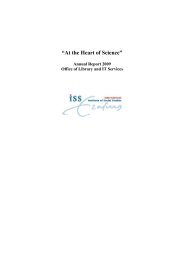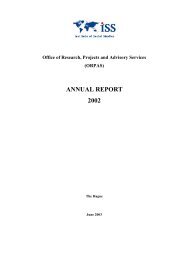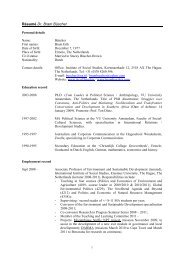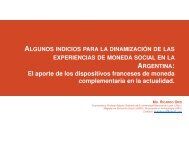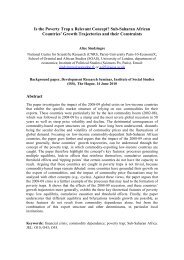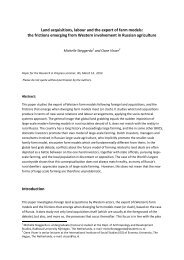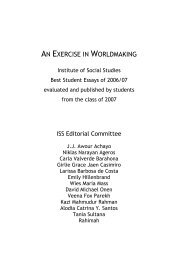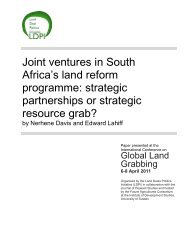AN EXERCISE IN WORLDMAKING 2009 - ISS
AN EXERCISE IN WORLDMAKING 2009 - ISS
AN EXERCISE IN WORLDMAKING 2009 - ISS
Create successful ePaper yourself
Turn your PDF publications into a flip-book with our unique Google optimized e-Paper software.
7 Does the Aid Consensus Shift from Washington to the South? 79<br />
on reconstruction and reconciliation and it has been internationally<br />
commended for its results. Rwanda reached the Highly Indebted Poor<br />
Countries initiative completion point under its first PRSP in 2005 and is<br />
now in the Multilateral Debt Relief initiative. The second EDPRSP is<br />
less rooted in a post-conflict context and therefore more suitable for<br />
analysis.<br />
Washington, Rwanda<br />
Given the critical literature on the oxymoron between conditionalities<br />
and country ownership of the document discussed above, it would be<br />
realistic to assume that at least some of the neoliberal policy recommendations<br />
can be found. Such a hypothesis is confirmed by the following<br />
remark on the process of writing the first PRSP:<br />
There followed considerable debate over several months, particularly with<br />
the IMF, mainly concerning the macroeconomic framework and the deployment<br />
of three expenditures scenarios. The World Bank also had concerns<br />
about some of the sectoral substance, about the need for more<br />
prominent attention for governance as a set of cross-cutting issues, and<br />
more minor matters of presentation. In March 2002, the Bank insisted<br />
that the PRSP be revised before it could be submitted for endorsement<br />
(Golooba Mutebi et al 2003: 257).<br />
Furthermore, compliance to IFI standards can be expected in the Latent<br />
South Consensus as well, as is explained above. And indeed, some<br />
of the neoliberal policies and theories from the past are reflected in<br />
Rwanda’s EDPRSP. In the introduction already one can read Rwanda’s<br />
compliance to some of the foundation values of the IFIs, such as transparency,<br />
efficient administration, respecting intellectual property rights,<br />
respecting the rule of law and others (Government of Rwanda [GoR]<br />
2007: 1-4).<br />
In the evaluation of its former PRSP (2002-2005) the neoliberal accomplishments<br />
are explicitly stated, such as the privatisation efforts by<br />
the Privatisation Secretariat for example (ibid.: 35). Furthermore, it<br />
makes the claim that both privatisation and liberalisation efforts for the<br />
period 2002-2005 led to greater private investments (ibid.: 18). As Sumner<br />
(op. cit.) points out, this might explain why these policies are not<br />
mentioned often in the remain of the document (the policies for 2008-<br />
2012).



